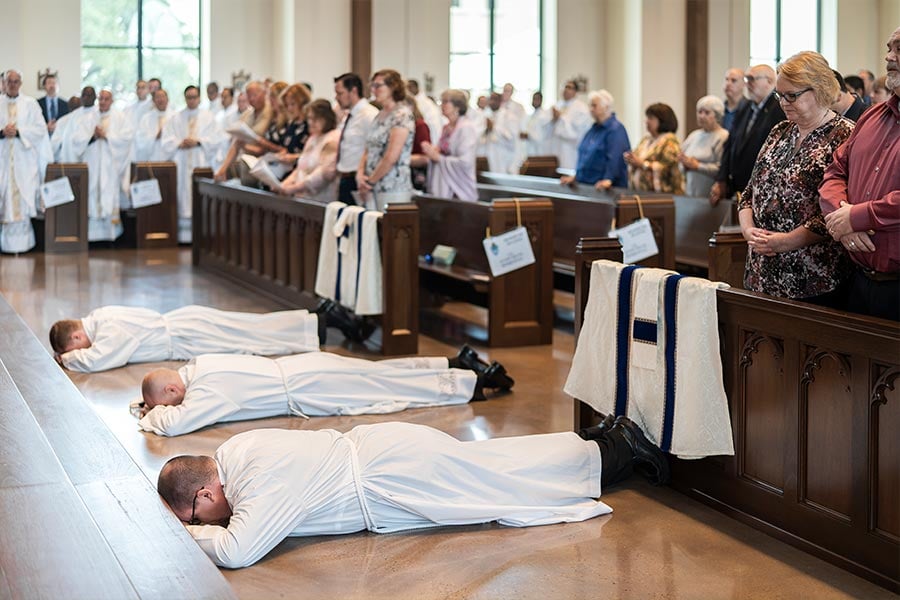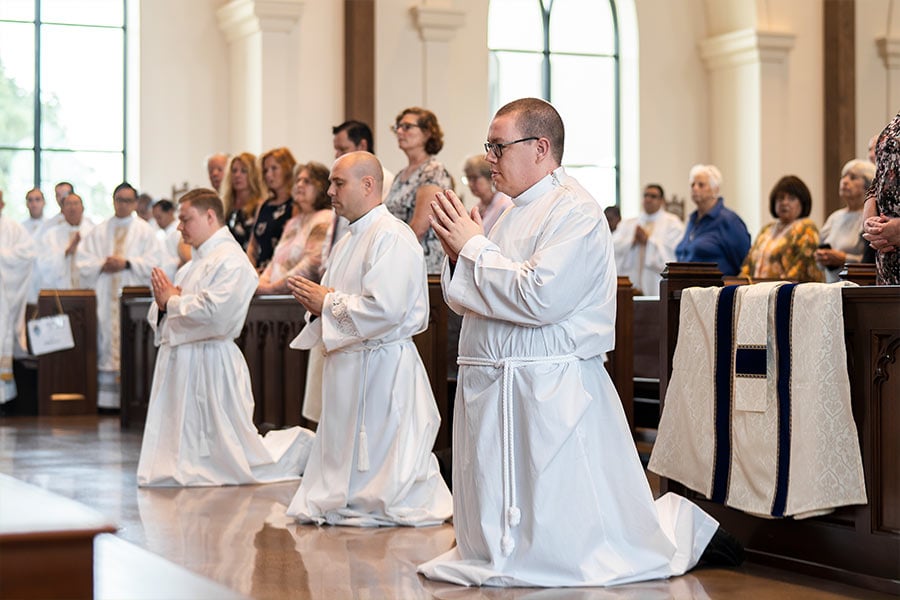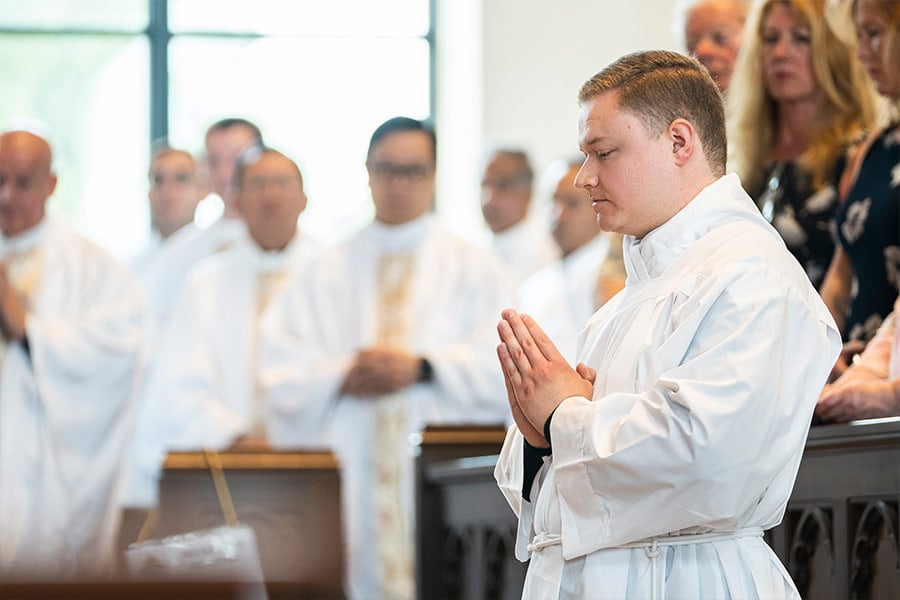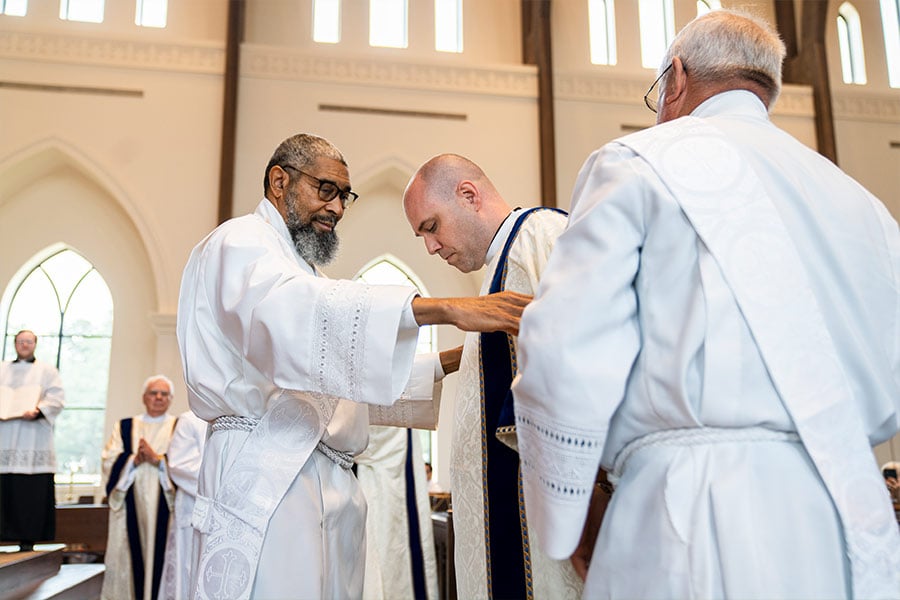Answering the call: three men ordained transitional deacons

The three diaconal candidates lie prostrate during the Litany of Saints at the ordination Mass on May 21, 2022 at St. Philip the Apostle Church. (NTC/Juan Guajardo)
FLOWER MOUND — Kelly Hoodenpyle is proud of her son for following his heart.
Tonya LeClair appreciates the prayers and support her son is receiving.
Randy Hopkins noticed his son always had a strong spiritual side.
Answering the call to serve God and His people, all three men were ordained transitional deacons May 21 at St. Philip the Apostle Church in Flower Mound.
More than 300 family members, friends, and supporters of the seminarians witnessed Fort Worth Bishop Michael Olson confer the sacrament of Holy Orders on Brandon Edward LeClair, Austin Travis Hoodenpyle, and Randolph Edward Hopkins Jr. during a Mass of Ordination rich in tradition and symbolism.
Advancing to the Sacred Order of the Diaconate marks the final year of formation to the priesthood. Deacons are ordained as a sacramental sign to the Church and world that Christ came not to be served, but to serve.
“They are dedicating their lives to our faith, so supporting them is crucial as they develop and guide us,” said Terra Coyle, who attended the Mass with other St. Philip parishioners. “A call to the priesthood can be a lonely journey. That’s why it’s important to make seminarians feel a part of the community wherever they serve.”
Welcoming worshippers to the morning liturgy, Bishop Olson thanked the parents, Serrans, members of the St. John Paul II Shepherd’s Guild, and others who prayed and supported the candidates throughout their time in formation.
“Strengthened by the gifts of the Holy Spirit, they will help the bishop and his priests in the ministry of the Word, the Altar, and of charity showing themselves to be servants of all,” he said, explaining the responsibilities that come with ordination.
Deacons proclaim the Gospel, administer Baptism, witness and bless marriages, bring viaticum to the dying, and conduct funeral services. As ministers of charity, they identify the needs of others and marshal the Church’s resources to meet those needs.
“Do the will of God in charity, from the heart,” the bishop instructed the ordinands who stood before him. “Serve others with joy as you would serve the Lord. Be like those once chosen by the apostles for the ministry of charity — men of good reputation, full of wisdom and the Holy Spirit.”
The Rite of Ordination began with Father Jonathan Wallis, the vicar general and director of seminarian formation, presenting the trio of candidates to the bishop who accepted them with the words, “We choose these, our brothers, for the Order of the Diaconate.” Reminiscent of the first “election” of seven deacons by the early Christians, the appreciative congregation applauded their consent.
In the homily that followed, Bishop Olson informed the soon-to-be deacons that the responsibility of each man called and ordained to Holy Orders is to live a life centrally devoted to Christ.
“Prayer for yourselves and others is essential to keep Christ central in your lives and to foster the faithful friendship that He offers you,” the bishop asserted. “May this Eucharistic celebration of your ordination to the diaconate help you to cherish that it is Jesus who has called you as friends and invites you to lay down your life with Him for His friends.”
In closing, he reminded his listeners, “God is the God of the truth, not of falsehood. God is the God of love, not of selfishness. God is the God of order, not chaos.”
After lying prostrate on the floor as the congregation prayed the Litany of the Saints, each candidate approached the bishop for the Laying on of Hands. This essential act of the ordination rite, handed down from the Apostles, signifies conferral of the Holy Spirit.
The newly ordained were then vested with the outward symbols of their ministry — the stole and dalmatic — by fellow deacons instrumental in their vocation.

Brandon LeClair kneels before the altar during the Rite of Ordination at St. Philip the Apostle Church in Flower Mound. (NTC/Juan Guajardo)
Wearing their diaconal vestments, the men knelt to receive the Book of Gospels from the bishop who commanded, “Receive the Gospel of Christ whose herald you have become. Believe what you read, teach what you believe, and practice what you teach.”
Calling the ordination of three transitional deacons a sign of hope, Fr. Wallis said many people have looked forward to this day for a very long time.
“It’s a great blessing for the Diocese of Fort Worth and the result of a lot of prayer, hard work, and dedication,” he said.
The vicar general urged North Texas Catholics to pray for seminarians, and other young men they think would make a good priest, by name.
“People are afraid to do that because they don’t want to put pressure on someone,” he added. “What you’re really doing is assisting them through your prayers and the grace of the Holy Spirit.”
Each of the three newly ordained deacons described a vocation journey steeped in prayer and transformation.
Brandon LeClair
A cradle Catholic, Brandon LeClair, 28, considered careers in teaching, criminal justice, and the culinary arts before a talk with his pastor at St. Jude Parish in Mansfield led to discerning the priesthood. Attending a Camp Fort Worth retreat reinforced his decision.
“I gave my vocation story and one of the kids observed that all my prior choices seemed to point to the priesthood — teaching the faith, guarding the flock, and bringing everyone to the table of the Lord,” said the former fifth grade religious education teacher.
Entering St. Joseph Abbey and Seminary College in 2015 with the blessing of his parents, Edward and Tonya LeClair, he grew in self-awareness thanks to philosophy courses.
“Now studying theology at Assumption Seminary in San Antonio takes me into the vocation process of becoming Christ’s priest,” LeClair said. “Being with other men discerning the same thing is very impactful.”
The new deacon, assigned to St. Mark Parish in Denton for the summer, advises young people to take seriously whatever God is calling them to do.
“Discernment isn’t just about the priesthood. It’s also about marriage or religious life so it’s important to surround yourself with people who can help you with that.”

Transitional diaconate candidate Austin Hoodenpyle kneels before the altar during the Rite of Ordination at St. Philip the Apostle Church on May 21, 2022. (NTC/Juan Guajardo)
Austin Hoodenpyle
Raised in the Methodist Church, Austin Hoodenpyle’s first exposure to Catholicism came during a trip to visit Catholic relatives in northern Illinois after the eighth grade.
“I remember going to Mass with them and being impressed by the beauty of the liturgy,” remembered the 27-year-old. “There was a mystery there I didn’t understand but it was enthralling.”
Returning to North Texas, his fascination with the faith grew as he continued to research what the Catholic Church teaches. His parents, Brent and Kelly Hoodenpyle, were supportive but surprised.
“It was strange for them to see their high school freshman watching Mother Angelica every day,” Hoodenpyle quipped, referring to the legendary founder of the Eternal Word Television Network.
Entering the Church in 2011 during the Easter Vigil Mass, the convert became immersed in parish life at St. Frances Cabrini as a lector and frequent volunteer at the Lenten fish fry. He seriously began discerning the priesthood during his senior year at Glen Rose High School and joined the seminary after graduation in 2013.
“I grew in love and gratitude for the sacraments and began to realize the way I wanted to serve Christ was to bring that grace to His people in the unique way only a priest can do,” Hoodenpyle explained.
A student at Catholic University of America’s Theological College in Washington, D.C., he will spend his diaconate year completing a bachelor’s degree in theology and a master’s degree in divinity.
Randolph Edward Hopkins
“A call to service has been with me throughout my life but I had to discern Who was calling,” disclosed Edward Randolph Hopkins, explaining the genesis of his vocation. “I grew up Baptist so there was no reason, as a young person, that I would have thought of becoming a priest.”
At 43, the Texas Christian University MBA graduate is one of the older men in formation. He converted to Catholicism 10 years ago after working as a special education teacher in Katy, Texas, and as a development professional for a Washington, D.C., trade association.
“Something outside of me just drew me to the faith. I’ve never been able to explain it,” Hopkins continued. “That’s what God had in store for me and little by little I figured it out.”
When he began considering the priesthood, his parents, Randy and Susan Hopkins, were “unbelievably supportive,” he recalled. “They weren’t surprised I wanted a life of service.”
Reading about the Church fathers and books by Catholic authors helped him discover the Benedictines. The Fort Worth native spent his early months of discernment living with the monks at the St. Vincent Archabbey in Latrobe, Pennsylvania.
“It was a great experience. I just wasn’t a good fit,” Hopkins said.
Preparing for his ordination, he revisited the Archabbey for some contemplative prayer.
“I spent a lot of time in the Marian grotto at the basilica there,” the seminarian shared. “Quiet time alone with God gives me strength.”
After a summer assignment at St. Elizabeth Ann Seton Parish, where he just completed his pastoral year, the new deacon will return to Assumption Seminary in San Antonio to finish his Master of Divinity degree.

Newly ordained transitional Deacon Randolph Edward Hopkins is assisted in vesting with the stole and dalmatic that are symbolic of the diaconate. (NTC/Juan Guajardo)
